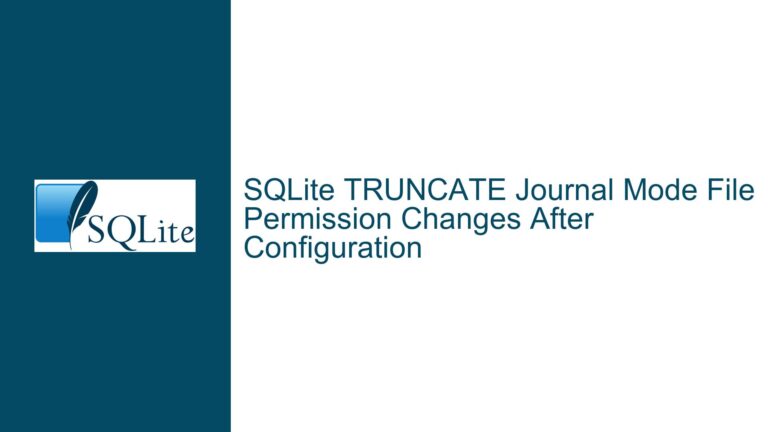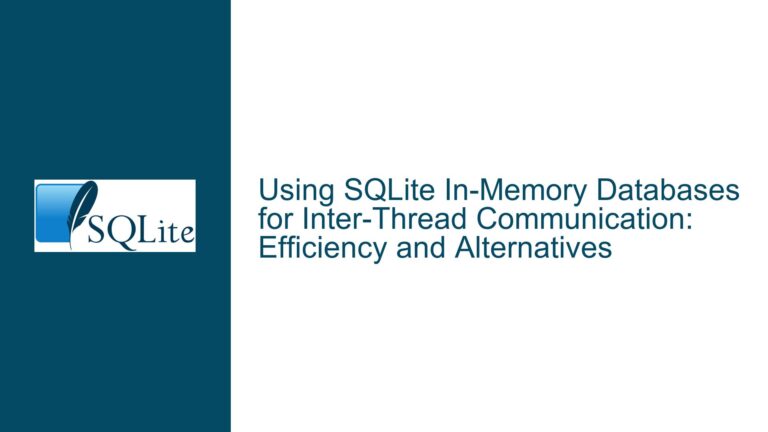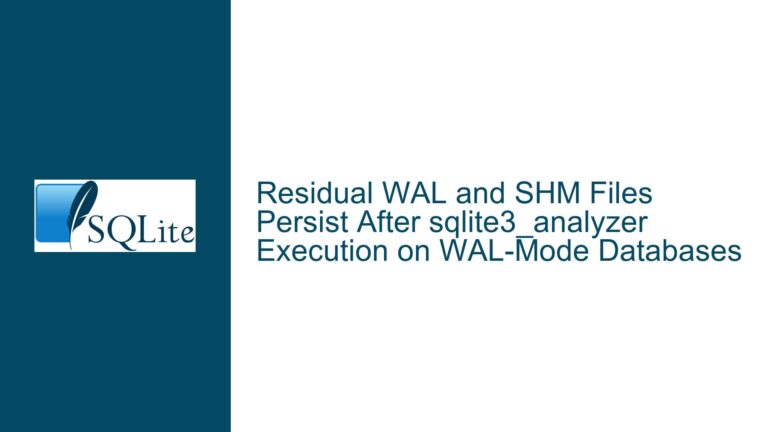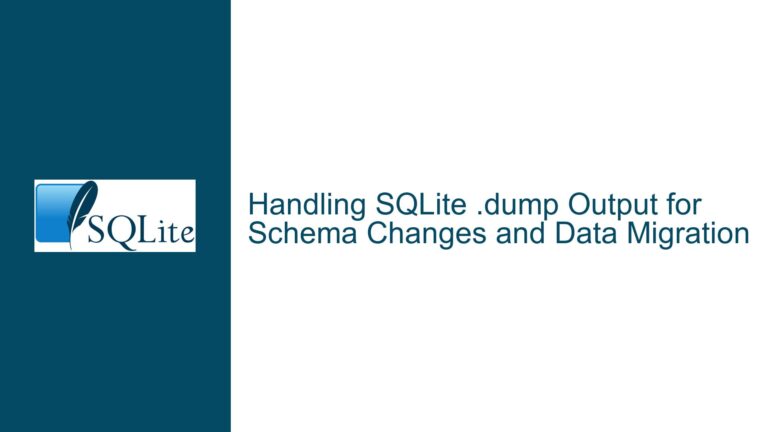Memory Zeroing in SQLite for Bug Detection and Stability
Access Violations in SQLite Due to Unregistered Eponymous Tables
Access violations in SQLite, particularly when working with eponymous tables and unregistering them, can be a challenging issue to diagnose and resolve. Eponymous tables are virtual tables that are automatically created and destroyed by SQLite, and they are often used for special purposes like querying system information or implementing custom functionality. When these tables are unregistered, SQLite must carefully manage the memory associated with them to avoid invalid memory access. In some cases, particularly when memory managers do not zero out freed memory, SQLite may inadvertently access memory that has been freed but not cleared, leading to access violations.
The issue becomes more complex when different programs exhibit different behaviors under similar conditions. For instance, one program may run without issues, while another experiences access violations. This discrepancy can often be traced back to the memory management strategy employed by the program. In the case of the Delphi FastMM memory manager, enabling memory zeroing upon freeing can reveal issues that would otherwise go unnoticed. Without memory zeroing, SQLite might successfully access freed memory, masking potential bugs that only surface under specific conditions.
Memory Management Strategies and Their Impact on SQLite Stability
The stability of SQLite, particularly when dealing with eponymous tables, is heavily influenced by the memory management strategies employed by the host application. Memory managers that do not zero out freed memory can obscure bugs that would otherwise be detected if the memory were cleared. This is because SQLite may continue to access memory that has been freed but not cleared, leading to unpredictable behavior. In contrast, memory managers that zero out freed memory can help reveal these issues by ensuring that any access to freed memory results in a clear and immediate error.
The difference in behavior between programs using different memory management strategies highlights the importance of thorough testing. SQLite is known for its rigorous testing practices, but the use of memory zeroing in tests can provide an additional layer of bug detection. By ensuring that freed memory is zeroed out, testers can more easily identify and address issues related to invalid memory access. This approach can be particularly valuable when working with complex features like eponymous tables, where memory management is critical to stability.
Implementing Memory Zeroing in SQLite Tests for Enhanced Bug Detection
To enhance bug detection and improve the stability of SQLite, it is recommended to implement memory zeroing in tests. This can be achieved by configuring the memory manager to zero out freed memory during test execution. By doing so, testers can more easily identify issues related to invalid memory access, particularly when working with eponymous tables and other complex features. This approach can help ensure that SQLite behaves consistently across different environments and memory management strategies.
In addition to implementing memory zeroing in tests, it is also important to thoroughly review and test any changes related to memory management. This includes verifying that all memory allocations and deallocations are handled correctly, and that any potential issues are identified and addressed before they can impact the stability of the application. By taking a proactive approach to memory management and testing, developers can help ensure that SQLite remains a reliable and stable database solution for a wide range of applications.
Detailed Analysis of Access Violations in SQLite
Access violations in SQLite can occur for a variety of reasons, but they are often related to improper memory management. When working with eponymous tables, SQLite must carefully manage the memory associated with these tables to avoid invalid memory access. This includes ensuring that memory is properly allocated and deallocated, and that any references to freed memory are cleared. Failure to do so can result in access violations, particularly when the memory manager does not zero out freed memory.
In the case of the Delphi FastMM memory manager, enabling memory zeroing can help reveal issues that would otherwise go unnoticed. Without memory zeroing, SQLite may continue to access freed memory, leading to unpredictable behavior. By zeroing out freed memory, the memory manager can help ensure that any access to freed memory results in a clear and immediate error, making it easier to identify and address potential issues.
The Role of Memory Zeroing in SQLite Testing
Memory zeroing plays a critical role in SQLite testing, particularly when it comes to identifying issues related to invalid memory access. By configuring the memory manager to zero out freed memory during test execution, testers can more easily identify and address issues that may not be apparent under normal conditions. This approach can be particularly valuable when working with complex features like eponymous tables, where memory management is critical to stability.
In addition to implementing memory zeroing in tests, it is also important to thoroughly review and test any changes related to memory management. This includes verifying that all memory allocations and deallocations are handled correctly, and that any potential issues are identified and addressed before they can impact the stability of the application. By taking a proactive approach to memory management and testing, developers can help ensure that SQLite remains a reliable and stable database solution for a wide range of applications.
Best Practices for Memory Management in SQLite
To ensure the stability and reliability of SQLite, it is important to follow best practices for memory management. This includes properly allocating and deallocating memory, and ensuring that any references to freed memory are cleared. Additionally, it is important to configure the memory manager to zero out freed memory during test execution, as this can help reveal issues that may not be apparent under normal conditions.
In the case of eponymous tables, it is particularly important to carefully manage the memory associated with these tables to avoid invalid memory access. This includes ensuring that memory is properly allocated and deallocated, and that any references to freed memory are cleared. By following these best practices, developers can help ensure that SQLite remains a reliable and stable database solution for a wide range of applications.
Conclusion
Access violations in SQLite, particularly when working with eponymous tables, can be a challenging issue to diagnose and resolve. By implementing memory zeroing in tests, developers can more easily identify and address issues related to invalid memory access. This approach can help ensure that SQLite behaves consistently across different environments and memory management strategies, and can help improve the overall stability and reliability of the database solution. By following best practices for memory management and testing, developers can help ensure that SQLite remains a reliable and stable database solution for a wide range of applications.






